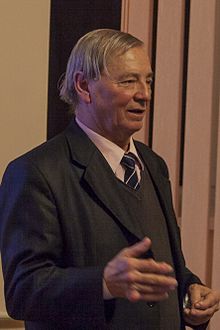Klim Churyumov
| Klim Churyumov | |
|---|---|

Churyumov in 2014
|
|
| Native name | Клим Іва́нович Чурю́мов |
| Born | Klim Ivanovich Churyumov 19 February 1937 Mykolaiv, Ukrainian SSR, Soviet Union |
| Died | 14 October 2016 (aged 79) Kharkiv, Ukraine |
| Citizenship | Soviet Union → Ukraine |
| Fields | Astronomy |
| Alma mater | Taras Shevchenko National University of Kyiv |
| Known for | research in physics of comets and the cosmogony of the solar system, discovery of two comets. |
| Notable awards | Order of Merit |
Klim Ivanovich Churyumov (Ukrainian: Клим Іва́нович Чурю́мов, Russian: Клим Ива́нович Чурю́мов) (19 February 1937 – 14 October 2016) was a Soviet and Ukrainian astronomer.
Director of the Kiev Planetarium, member of the National Academy of Sciences of Ukraine, the International Astronomical Union, of the New York Academy of Sciences, editor of the magazine "Our Skies" (Ukrainian: Наше Небо) in 2006-2009, president of the Ukrainian Society of amateur astronomy and author of books for children.
In 1969 he discovered, with Svetlana Gerasimenko, the comet 67P/Churyumov–Gerasimenko; on 12 November 2014 the Rosetta space mission landed its Philae spacecraft on its surface.
He was the fourth of eight children of Ivan Ivanivich Churyumov and Antonina Mikhailovna Churyumova (b. 1907). His father was declared dead during World War II in 1942.
In 1949 Churyumov's family moved from Mykolaiv to Kiev. After seventh grade, he entered the Kiev Railway College, graduating with honors in 1955. He received a recommendation for admission to higher education.
He entered the Physics Department of Kiev State University. During his third year of study, he was disappointed to be assigned to the faculty of optics, instead of theoretical physics. However, he continued to attend lectures on theoretical physics, even though the authorities disapproved, and he was eventually moved to the faculty of astronomy, where there were vacant places.
...
Wikipedia
